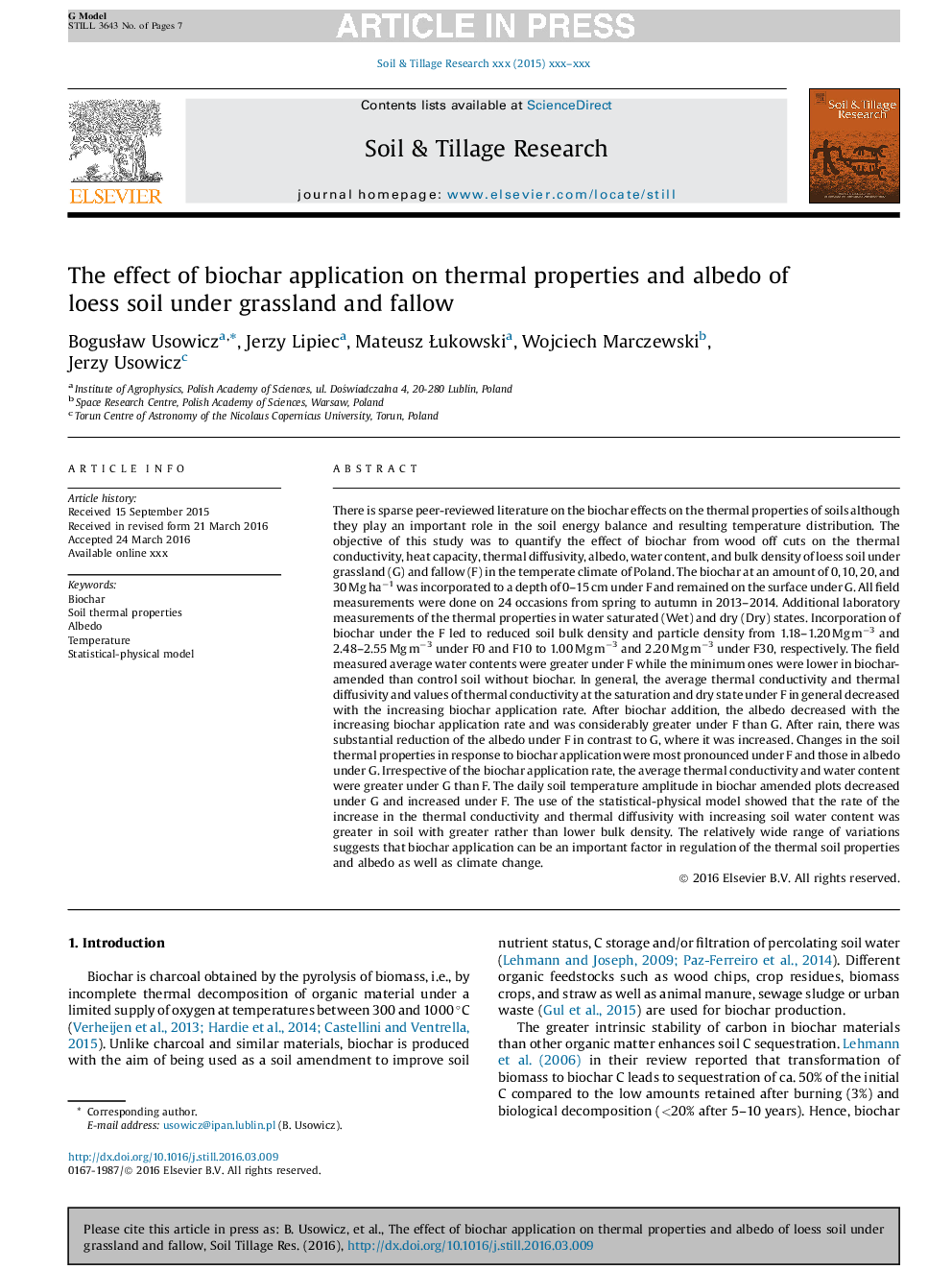| کد مقاله | کد نشریه | سال انتشار | مقاله انگلیسی | نسخه تمام متن |
|---|---|---|---|---|
| 6773381 | 513022 | 2016 | 7 صفحه PDF | دانلود رایگان |
عنوان انگلیسی مقاله ISI
The effect of biochar application on thermal properties and albedo of loess soil under grassland and fallow
ترجمه فارسی عنوان
تأثیر کاربرد زیستی خوار بر خواص حرارتی و آلبدو خاک لس در چمنزار و چمن زنی
دانلود مقاله + سفارش ترجمه
دانلود مقاله ISI انگلیسی
رایگان برای ایرانیان
کلمات کلیدی
موضوعات مرتبط
مهندسی و علوم پایه
مهندسی انرژی
انرژی های تجدید پذیر، توسعه پایدار و محیط زیست
چکیده انگلیسی
There is sparse peer-reviewed literature on the biochar effects on the thermal properties of soils although they play an important role in the soil energy balance and resulting temperature distribution. The objective of this study was to quantify the effect of biochar from wood off cuts on the thermal conductivity, heat capacity, thermal diffusivity, albedo, water content, and bulk density of loess soil under grassland (G) and fallow (F) in the temperate climate of Poland. The biochar at an amount of 0, 10, 20, and 30 Mg haâ1 was incorporated to a depth of 0-15 cm under F and remained on the surface under G. All field measurements were done on 24 occasions from spring to autumn in 2013-2014. Additional laboratory measurements of the thermal properties in water saturated (Wet) and dry (Dry) states. Incorporation of biochar under the F led to reduced soil bulk density and particle density from 1.18-1.20 Mg mâ3 and 2.48-2.55 Mg mâ3 under F0 and F10 to 1.00 Mg mâ3 and 2.20 Mg mâ3 under F30, respectively. The field measured average water contents were greater under F while the minimum ones were lower in biochar-amended than control soil without biochar. In general, the average thermal conductivity and thermal diffusivity and values of thermal conductivity at the saturation and dry state under F in general decreased with the increasing biochar application rate. After biochar addition, the albedo decreased with the increasing biochar application rate and was considerably greater under F than G. After rain, there was substantial reduction of the albedo under F in contrast to G, where it was increased. Changes in the soil thermal properties in response to biochar application were most pronounced under F and those in albedo under G. Irrespective of the biochar application rate, the average thermal conductivity and water content were greater under G than F. The daily soil temperature amplitude in biochar amended plots decreased under G and increased under F. The use of the statistical-physical model showed that the rate of the increase in the thermal conductivity and thermal diffusivity with increasing soil water content was greater in soil with greater rather than lower bulk density. The relatively wide range of variations suggests that biochar application can be an important factor in regulation of the thermal soil properties and albedo as well as climate change.
ناشر
Database: Elsevier - ScienceDirect (ساینس دایرکت)
Journal: Soil and Tillage Research - Volume 164, December 2016, Pages 45-51
Journal: Soil and Tillage Research - Volume 164, December 2016, Pages 45-51
نویسندگان
BogusÅaw Usowicz, Jerzy Lipiec, Mateusz Åukowski, Wojciech Marczewski, Jerzy Usowicz,
